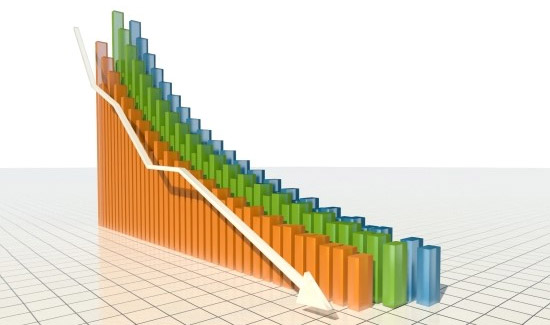Most people assume that prices move as a result of changes in the money supply. Instead, let’s look at the effect of changes in interest. To start, consider a hamburger restaurant. Suppose that the average profit in the burger business is ten percent of invested capital. If MacDowell’s is thinking about expanding, it has to consider the interest rate. Why? Typically, most of the capital to expand a business is borrowed. MacDowell’s has to borrow the cash to build out its new store. If the cost of capital is greater than the return on capital, then it makes no sense to expand. Let that sink in, because it is vitally important. You cannot borrow at 10% to earn 8%. Of course not all of the capital is borrowed. MacDowell’s also puts up some of its own funds (or at least it would in a normal world without a central bank drowning the markets with liquidity). The company has to consider what else it could do with that cash. If it could earn more on a bond portfolio, why should it take business risk? Let this sink in also. You should not invest in business equity to earn less than the yield on bonds. We have just looked at two connections between interest and profit margins. It is both impossible and undesirable, to expand a business which earns less than the interest rate. Now let’s look at the connection in the other direction.
Topics:
Keith Weiner considers the following as important: falling interest, falling profit, Featured, unintended conequences, YPP interest rate
This could be interesting, too:
Nachrichten Ticker - www.finanzen.ch writes Die Performance der Kryptowährungen in KW 9: Das hat sich bei Bitcoin, Ether & Co. getan
Nachrichten Ticker - www.finanzen.ch writes Wer verbirgt sich hinter der Ethereum-Technologie?
Marc Chandler writes March 2025 Monthly
Mark Thornton writes Is Amazon a Union-Busting Leviathan?
Most people assume that prices move as a result of changes in the money supply. Instead, let’s look at the effect of changes in interest. To start, consider a hamburger restaurant. Suppose that the average profit in the burger business is ten percent of invested capital. If MacDowell’s is thinking about expanding, it has to consider the interest rate. Why?
Typically, most of the capital to expand a business is borrowed. MacDowell’s has to borrow the cash to build out its new store. If the cost of capital is greater than the return on capital, then it makes no sense to expand. Let that sink in, because it is vitally important. You cannot borrow at 10% to earn 8%.
Of course not all of the capital is borrowed. MacDowell’s also puts up some of its own funds (or at least it would in a normal world without a central bank drowning the markets with liquidity). The company has to consider what else it could do with that cash. If it could earn more on a bond portfolio, why should it take business risk? Let this sink in also. You should not invest in business equity to earn less than the yield on bonds.
We have just looked at two connections between interest and profit margins. It is both impossible and undesirable, to expand a business which earns less than the interest rate. Now let’s look at the connection in the other direction. MacDowell’s profit-seeking behavior actually affects interest.
What happens to the interest rate if MacDowell’s borrows at two percent to build a hamburger stand that makes ten percent? The very act of borrowing pushes up the interest rate slightly (in a normal world). The very act of opening another hamburger store pushes down the rate of profits on hamburger stores.
To oversimplify for this example, the rate of interest goes up to three and the rate of profit comes down to nine. That’s still pretty attractive, so Burger Emperor opens up a store. Interest is pushed up to four, and profit pulled down to eight. And so on, until the next would-be burger baron walks away. Certainly, if the rate is six and profit is six, then no one else will want to enter this business. The same process happens in every industry.
Today, of course the central banks pin the interest rate down. So MacDowell’s and Burger Emperor’s borrowing do not push up the interest rate. However, they still do pull down the rate of profit. They will keep adding to the burger supply, until the rate of profit is just above the Fed-administered interest rate.
Monetary policy claims to try to affect consumer prices—but it’s working its deadly effect on profits. Interest rates can’t go up, but profits can come down.
It turns out that this monetary policy does affect prices, though not in the way claimed by the mainstream theory. Suppose Wednesday’s is the last burger business to borrow, the last to pull the rate of profit as close as possible to the rate of interest. How is Wednesday’s supposed to make this work? Worse yet, how is Burger Emperor staying alive with its higher interest rate, and McDowell’s with its even-higher rate?
They are locked in a desperate scramble to squeeze out every cost. They develop processes to do without inventory, depending on just-in-time delivery. They automate and lay off as much labor as possible. Executives fly coach when they get travel budget at all. They redesign their packaging to be cheaper, etc.
I don’t normally use the term unintended consequences. I prefer to discuss perverse outcomes, rather than emphasize policy maker real or claimed intentions. However, in this case I think it’s safe to say that the Fed is getting the opposite of what it intends. It wants prices to rise by 2 percent. What is it actually getting?
Just look at the wreckage in the crude oil chart, copper, or even wheat markets.

